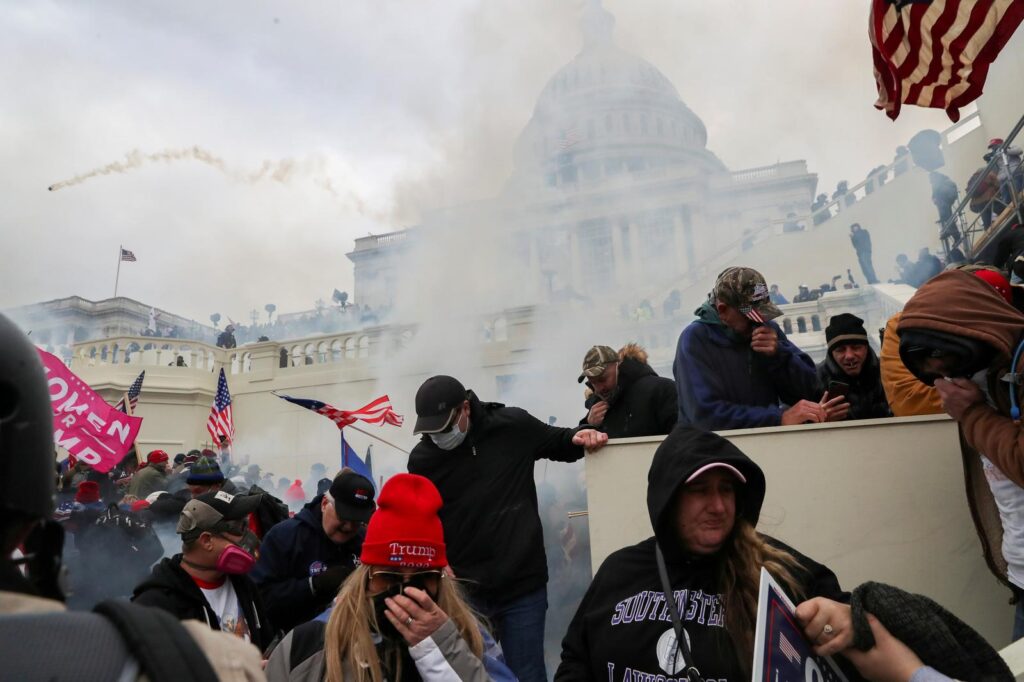If Capitol Rioters Were Black, ‘Hundreds’ Would Have Been Killed
Jan 8, 2021 | Pratirodh Bureau
FILE PHOTO: Supporters of U.S. President Donald Trump cover their faces to protect from tear gas during a clash with police officers in front of the U.S. Capitol Building in Washington, U.S. on January 6, 2021
The United States’ stark racial inequality was on display after a mob of predominantly white supporters of President Donald Trump stormed the U.S. Capitol with ease on Wednesday, then left with few immediate consequences, according to Washington residents, activists and politicians, including President-elect Joe Biden.
The rioters broke through barricades, smashed windows, snatched souvenirs and entered Congressional offices and chambers, some taking photographs with police.
Some carried trophies with them as they walked out.
The lack of security and limited police response, despite weeks of promotion of the pro-Trump protest that sparked the riot, was in sharp contrast to the largely peaceful Black Lives Matter protests in Washington six months ago.
“My mom said if you did this you’d be shot,” Beatrice Mando, who works for the district and attended BLM protests last year. “She is right. There would be hundreds dead, if not more, had this group been Black.”
In a speech on Thursday, Biden agreed there was a sharp contrast.
“No one can tell me that if it had been a group of Black Lives Matter protesting yesterday, they wouldn’t have been treated very, very differently from the mob of thugs that stormed the Capitol,” he said.
The United States saw a summer of widespread demonstrations against racial injustice that began in May following the killing of George Floyd, a Black man who died as a Minneapolis police office knelt on his neck for nearly nine minutes.
In Washington, participants in those protests said their reception was very different.
“There were cops at every intersection in DC. There were cops at all the monuments, at the Capitol, in front of the White House,” said Abby Conejo, 29, who works at a small business in Washington.
The Black Lives Matter protesters in Washington had been faced with rows of masked National Guard troops at the Lincoln Memorial in June, as Trump vowed to crack down on what he called lawlessness by “hoodlums” and “thugs.”
One evening, baton-swinging police fired smoke canisters, flashbang grenades and rubber bullets to drive peaceful protesters away from the White House, so that Trump could walk to a nearby church and be photographed holding a Bible.
“They treated us like the enemy,” Conejo said. “Where was that anger and rage yesterday? Why were these people treated like friends?”
WORRIED ABOUT A REPEAT
The D.C. Police Department said on Thursday it had arrested 68 people in connection with the Capitol unrest. In comparison, nearly 300 were arrested the evening that police cleared Black Lives Matter protesters from near the White House.
Capitol Police Chief Steven Sund praised his officers, saying they “responded valiantly” when demonstrators attacked them with “metal pipes, discharged chemical irritants and took up other weapons” and also faced two pipe bombs.
Sund later said he would resign effective Jan. 16, according to a letter cited by news outlets.
Local residents said they worried that the police response was so muted there may be a repeat.
Charles Allen, a D.C. council member who represents the area, said he and his neighbors are used to First Amendment demonstrations and large gatherings.
“That was not what this was. This was an insurrection. This was domestic terrorists coming into our city and trying to overtake the Capitol,” Allen said, adding it was traumatic for the neighborhood.
“I think that people will feel emboldened that they can do this and I think on top of it, they feel emboldened because they left with souvenirs,” he said.
Among the mob who stormed the Capitol were individuals who waved Confederates flags and wore clothing carrying insignia and slogans espousing white supremacist beliefs.
“It felt like abuse to see not just white privilege but white supremacy in action,” said Makia Green, a Black Lives Matter organizer in Washington. “To see the bias from the government, from the police.”
KIPP DC Public Schools, a group of local charter schools, canceled classes on Thursday, citing the feelings of its mostly Black student body after the riot.
“We are disgusted when we think about the contrast between how our country is responding to this act of domestic terrorism vs the peaceful protests of this past summer,” it said in a statement. Charles McKinney, associate professor of history at Rhodes College in Tennessee, said Wednesday’s events in Washington were a reminder of the “gross disparities” in how Black people and white people are treated by law enforcement.
“The response from law enforcement was a blatant display of systemic racism. It was a display of white privilege, the disparities in policing in this country,” he said.
by Nandita Bose, Makini Brice/Reuters
